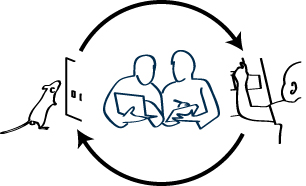Behavioral Sciences Facility
Our Mission
The Behavioral Sciences Facility is a collaborative facility administered by the EHSC and the University of Rochester Intellectual and Developmental Disabilities Research Center (UR-IDDRC). The purpose of this Facility is to provide state-of-the-art equipment and expertise for the design, conduct, and interpretation of human and animal behavioral studies. The objectives are not only to administer established and well-validated procedures and tests, but also to develop and implement new behavioral paradigms.
Directors

Dr. Cory-Slechta has over 25 years of experience in animal and human behavioral testing. She has published over 130 papers describing the assessment of multiple behavioral domains in animals and human studies that range from young children to senior adults.
Dr. Sobolewski has studied behavior across multiple species from rodents to chimpanzees in both the laboratory and in the field. This comparative research across species is critical to bidirectional translation for neurobehavioral disorders.
 The Advantage of Bidirectionality Under One Roof
The Advantage of Bidirectionality Under One Roof
Having a multi-species proficient research group working on your project means that as your research data is being processed, we are able to make suggestions for translational work that might not be apparent to someone who is used to working with just one species.
To see the array of functional domains that can be tested across species, see our animal/human capabilities table.
